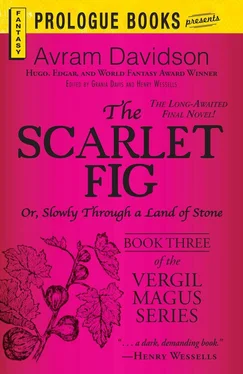The secret of the Castor and Pollux … its real purpose was no longer a secret, then. In Rome, debarred by the depredations of the Sea Huns from an easy trade with Tyre, the immemorial source of purple dye in the east; and by the clandestine but none the less effectual blockade by Carthage of its own special sources in the Trans-Herculean west; in Rome, the price of purple, so essential for the best class of clothing dye, had gone nowhere but up. Just as the high price of Indian pepper had had as its result a trade in the pseudo-pepper (called grains of paradise ) from Farther Africa — it was by no means the equal of the Indoo or proper pepper, but did well enough as an adulterant thereof — much better than poppy seed, for instance — so there had grown a pressing need for a sort of pseudo-purple (since the unsatisfactory surrogate provided by Averno was in any case no longer currentlyavailable) … a dye-stuff which would stain a robe well enough for it to pass for purple by, anyway, lamp or torch-light. With, anyway, that is, at least a little of the pure purple admixed. Many stratagems were tried, perhaps the best of which was to unravel a robe or a length of cloth estained with pure purple and use the thread so obtained as warp and the impure purple for the woof (or vice versa, if one follows). There was, as with all such tricks, the unwillingness of such a garment to stay fast-colored. But not everyone who wished a purple robe wished to use it often. The secret, or true purpose of the Castor and Pollux , therefore, was to lade aboard a cargo of a paste made from the flowers of the orchil plant, which paste, made quick with lime, oyster-lime or marble-lime (some said with one, some said with both) and water, was declared by anyway some dyers to produce a shade of violet which, mixed subtly … so they hoped … with purple to pass as pourpre , the res itself … by lamplight.
And so it might. For some. And for those absolutely exacting in the matter, and who wished to display their exacting exactitude in the sunlight: why, they might always obtain their desire for enormous, some said for extortionate, prices. And while the mysterious power of Carthage , so oft destroyed, might be growing rich and yet richer by their self-declared monopole of pourpre or porphyro; this mysterious authority called Carthage, wherever Carthage now was, was well-aware of the existence of a trade in orchil-flower, a “purple” both counterfeit and contraband. And so Carthage had declared an utter ban on alien ships in the western-most waters during and largely before and largely after, the season in which the orchil plant was in flower.
Which left not very much season at all.
The Carthage-men would have termed even so small a craft as Castor and Pollux , which had been seeking in the Atlantis islands for a plant-dye substitute for the genuine sea-purple made from a certain shellfish — they would have called the little ship an interloper, perhaps in an even fiercer justification for discountenancing such a venture, they might have called the craft a pirate. For any infringement of any monopole of Carthage the Carthagans regarded not only as a crime against themselves, but as a crime against Nature and against all moral laws soever.
Had not Nature, as exemplified by Juno, preferred Carthage — the “New City” in terms of the old cities of the Levant, but (so twas claimed) an Old City … anyway older … in terms of Rome? queen Dido’s heirs had long offered on the Altar of Juno when King Romulus still played with the nurse-wolf’s paps …
Argument, Vergil well-knew, was useless.
Ishtar of Tarshish [11] What the concise connexion was between the Lady Ishtar and the Land of Tarshish, surely The Matter knoweth. But The Matter sayeth not.
! Twas vain!
Talking over this matter with the Captain Polycarpu not so long after coming aboard, the small ship having left the Land of Lotus-Eaters well behind, idly Vergil asked, “Well, Messer Capitan, and have you ever heard of one Hemdibal, a Pune, who calls himself or is sometimes called —”
“Josaias, King of Carthage? Aye, that. Heard too much more nor we like. Crawls up and down the lands and seas, that one, like some gret sarpint-snake. Ben’t no place safe fro him. Or his.” He was a moment silent. Then he shuddered. The notion came to Vergil, not the first coming nor the second, that he might better have taken his passage on some other craft … and, as always, that calm, cool voice, which took not much notice of, were the Dioscuri hatched from one egg or two, said voice had asked him, like a goodlier version of that daemon which the habitants of Araby Felicitous say sits upon the shoulder and whispers in the ear: What “other craft”? it asked. Lotophagea lay on no shipping lane such as connected, say, Ostia and Napoly: which, had it been a lane on land, so frequent usage must have graved grooves into the way.
Thinking best to change the matter, yet, like every man aboard, never once leaving off gazing roundabout the sea for any sign of any ship; Vergil said, “Your sails and shrouds seem much the worse for their wear, Ser Capitan.”
“Stone me with stones if we all don’t know that well! If we hadn’t espeared your smokes, which, by their well-known signal advised of us that a castaway did habit there and twas no mere smoke as they wittold eaterds and drinkards of that Scarlet Fig kape a-burning to toast their foolish feet, we’d perhap be by now at Isle Mazequa, which it lie as due west of Mauretayne as a man may rightly rackon: a renewing of sails and shrouds and sheets and lines alike …”
Vergil murmured something apologete and exculpatory, but Polycarpu waved it away. “Twas meant to be, depend upon it, Ser, if you was to castivate my nativity upon un a they ephermeris, you’d find it so designate.” Vergil expressed his thanks, regretting that, alas, he had no ephemeris along with him. And if Polycarpu had known his natal day, let alone the hour of naissance, (instead of, say, twas the hour our old ewe-crone Mima drapped her last lamb, I heard me grandam say … two days and a full week after that gret storm o wind that bruck the fishing fleet a fierce: the year? Plauto was consul then … or was it Glauto? Marcu was empery … I b’lieve) — why: that would have been a greater marvel than any marvel yet descried by any caster of nativities and drawer of horoscopes since Nabucodonosorus, famed for his herbal diet, had first devised that cleanly and exactive science.
It was a day and half a day before the welcome cry of, “ A land I spy! I spy a land! ” As was only customary and polite, Vergil had responded with, “ What shore? What coast of people? ”
The answer came, “Isle Mazequa, as any fool might ken … what shore or coast wast expecting of? Candia, Gret Asia More? or Felick Arabia?” But an older seaman gave the lad a kick and a cuff, explaining, as he turned to Vergil, “ ‘A stripling, a mat, and an oliver tree/ The more ye beat ‘em, the better they be.’ ”
The landfall on that small and rather barren island was late in the day, and so worn were the ropes and cables that they made the tiny harbor under oars, the winds being a bit gusty, so that the captain was fearful and fretful of any strain at all. Hasten round the port-town as they might, they found nothing in the way of already-made sail, or ready-to-use leathern shrouds or cable-ropes. They found a good deal of such as this:
“You are Catus the hide-flenser?”
“For sure I be, and for to sarve ye.”
“Then who is Joquimo the tanner?”
“Hm, well, I am Joquimo the tanner, Catus the hide-flenser he was my lawful brother, these seis months his foot is no more on arth, but I has compacted with his widdy to overtake his trade for sure I can flense an hide ever as good as he could, a peace upon his bones; how may I sarve ye?”
Читать дальше











